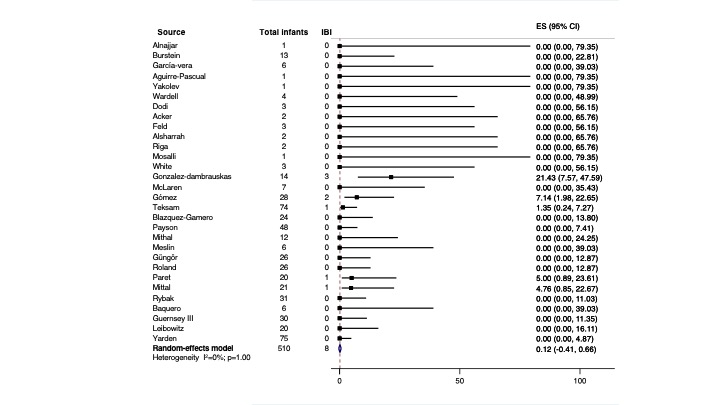Emergency Medicine: All Areas
Emergency Medicine 3
59 - Prevalence of invasive bacterial infection in febrile infants 90 days and younger with a COVID-19 positive test: Systematic Review and Meta-analysis.
Publication Number: 59.112

Silvia Pérez Porra, MD (she/her/hers)
Pediatrics resident
Hospital Universitario Río Hortega
Valladolid, Castilla y Leon, Spain
Presenting Author(s)
Background:
Since the outbreak of the SARS-CoV-2 pandemic, one of the questions posed to clinicians is whether a positive COVID-19 test result in a young febrile infant reduces the risk of invasive bacterial infection (IBI), as with other viruses. Although some previous studies suggest this possibility, their sample size is insufficient to answer this question with certainty.
Objective:
To conduct a systematic review and meta-analysis to determine the prevalence of IBI among febrile infants up to 90 days of age with a positive COVID-19 test (PCR or antigen test).
Design/Methods:
MEDLINE, Embase, Cochrane Central Register databases, Web of Science, ClinicalTrials.gov, and grey literature were searched for articles published from February 2020 to December 2022. Investigations were included if they reported on infants up to 90 days of age with fever (a registered temperature at home or in the emergency department ≥ 38°C/100.4ºF) and a positive test for SARS-CoV-2 (antigen test or PCR). Case reports with less than three patients, articles written in a language other than English, French, or Spanish, editorials, and other narrative studies were excluded. PRISMA guidelines were followed, and NIH Quality Assessment Tool for Observational Cohort and Cross-Sectional Studies was used to assess study quality. The study was registered in PROSPERO (CRD42022356507). Main outcome was the prevalence of IBI (a pathogen bacterium identified in blood and/or cerebrospinal fluid). As a secondary outcome, the prevalence of urinary tract infection (UTI) was assessed. Forest plots of prevalence estimates were constructed for each study. Heterogeneity was assessed and data were pooled by meta-analysis using a random-effects model. A fixed continuity correction of 0.1 was added when a study had zero events.
Results:
The literature search provided 1025 studies. Following the title, abstract, and full-text screening 109 studies were included in the qualitative assessment, and 30 were included in the meta-analysis, reporting a total of 510 febrile infants with a COVID-19 positive test and blood or cerebrospinal fluid culture obtained. The pooled prevalence of IBI was 0.12% (95% confidence interval [CI] 0% to 0.66%; I2=0%) (Figure 1). When analyzed independently, the pooled prevalence of bacteremia was 0.05% (95% CI 0% to 0.5%) and meningitis 0.07% (95% CI 0% to 0.61%; I2=0%). The prevalence of UTI was 2.4% (95% CI 1.0% to 3.8%; I2=0%).
Conclusion(s):
COVID-19-positive febrile infants up to 90 days of age are at low risk of IBI, so they can possibly be managed without a blood test. However, UTI should be ruled out in those patients.
